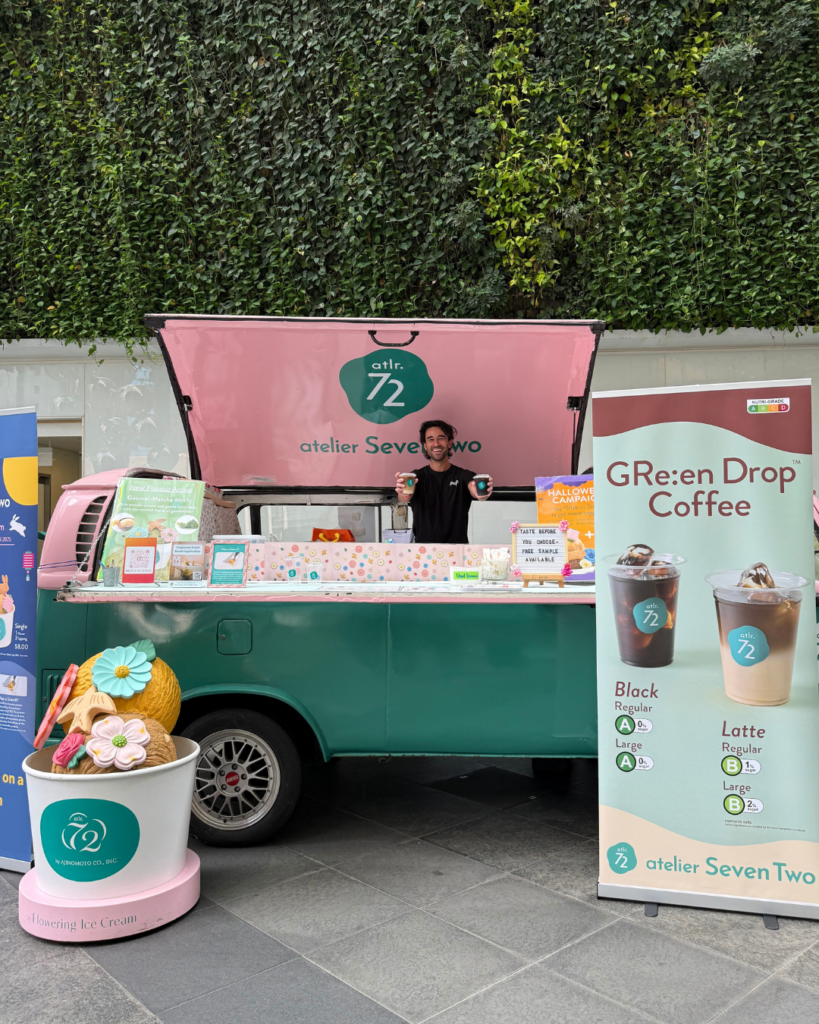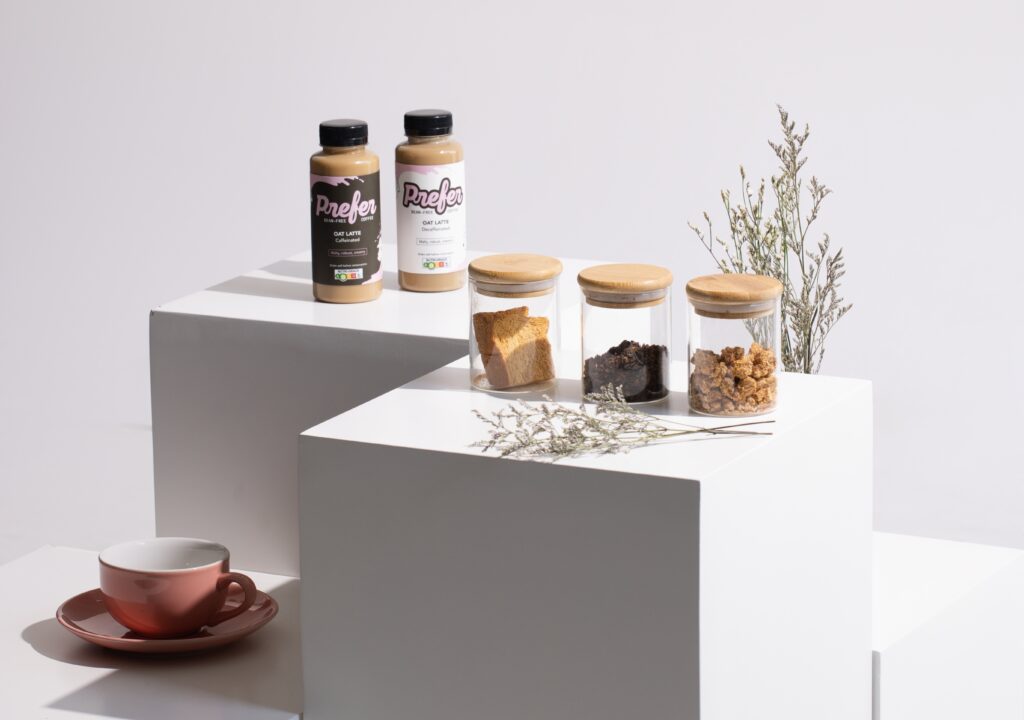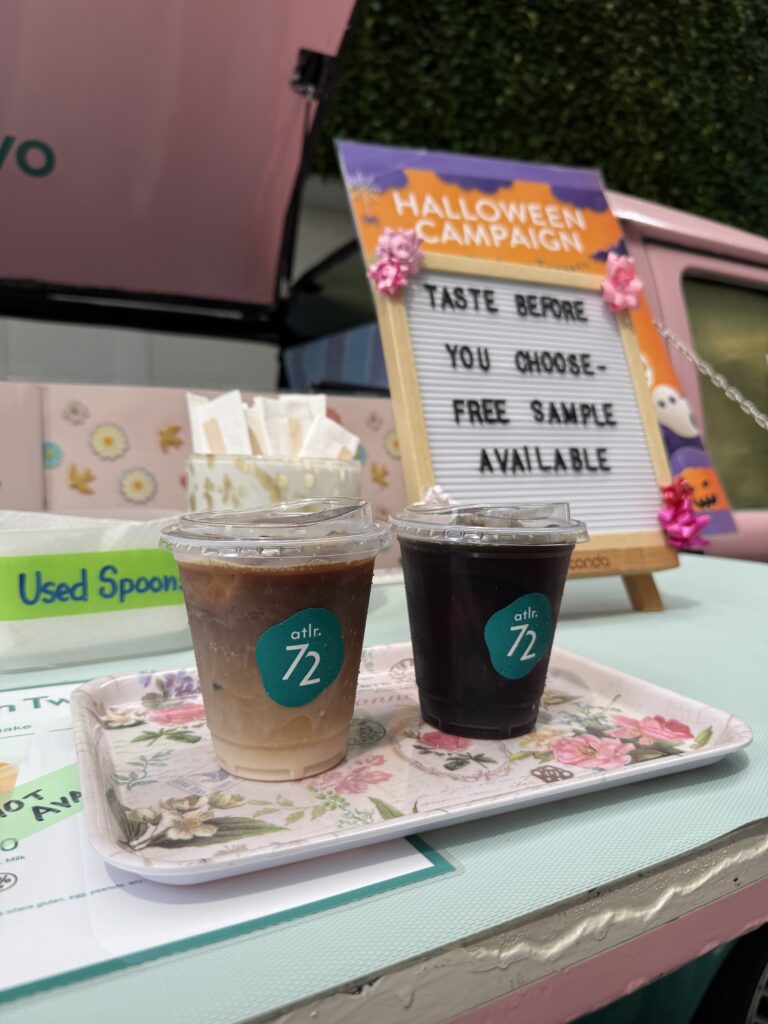
Japanese food conglomerate Ajinomoto has introduced beverages using Prefer’s beanless coffee and Solar Foods’s Solein gas protein in Singapore.
An iced latte with coffee made without beans, milk without cows, and protein produced from thin air.
That may seem like a dystopian drink, but it’s already available in Singapore, courtesy of the Ajinomoto Group, the Japanese food giant that first popularised MSG.
The company has unveiled GRe:en Drop Coffee, a new line of coffee beverages under its Atlr.72 brand, in collaboration with Finnish gas protein producer Solar Foods and Singaporean bean-free coffee maker Prefer.
In a weeklong preview at Singapore’s Ocean Financial Centre, Ajinomoto will serve two iced beverages featuring Prefer’s soluble coffee extender, PreferRoast, which replaces 30% of their conventional coffee content. This includes a batch-brewed filter coffee and a latte – well, a cafe au lait, if we’re being specific – with oat milk and a dairy-free cream made from Solar Foods’s Solein protein.
The innovation tackles multiple frontiers. By substituting dairy and, partly, coffee, it offers a more climate-friendly drink with far fewer emissions, land use, and water consumption. It’s inclusive for people with dairy allergies or intolerances. And Prefer’s fermentation-derived alternative is up to 50% cheaper than conventional coffee.
“The partnership with Ajinomoto is a positive signal for the future of coffee. With their innovative mindset, the industry and coffee lovers are in good hands,” Prefer co-founder and CEO Jake Berber tells Green Queen.
The beans used by Ajinomoto in 70% of the GRe:en Drop Coffee are dark-roasted. “Our nutty, chocolatey profile complements it perfectly for Singapore coffee drinkers,” he says. “Partnering with Solar Foods is really exciting. Solein adds sustainable protein, and the latte is damn tasty.”
Microbial fermentation at the heart of the innovation

Prefer leverages fermentation and food waste to develop solutions to climate-threatened crops. It upcycles food industry byproducts and ferments them with food-grade microbes. These ingredients are then roasted and ground just like conventional coffee, with the process unlocking the same aroma volatiles found in them.
Currently, the startup uses broken rice and chickpeas as the feedstock. “We’re sourcing our ingredients locally, and PreferRoast has an 8.8x smaller carbon footprint than coffee, which is related to significant water savings,” says Berber. “We offer [producers] a more affordable coffee, allowing those savings to be passed on to customers.”
Solar Foods also uses microbial fermentation to produce Solein, but instead of sugar or food products, it feeds them on carbon dioxide, hydrogen and oxygen, eliminating the need for farmland or water for irrigation. The microbes are grown in liquid form, and later dried into a flavourless powder that has 78% protein, 6% fat, 10% dietary fibre, as well as iron and B vitamins.
The company calls Solein the “most sustainable protein” on Earth. The main raw materials for production are carbon dioxide and renewable energy, resulting in emissions equal to just 1% of those generated by conventional meat, and 20% of plant proteins.
Solein has already powered mooncakes, ice cream sandwiches and “flowering” ice creams under the Atlr.72 brand, which focuses on using plant-based, cell-based and microbial ingredients to advance Ajinomoto’s green business – one of its four growth areas.
For this latest product, Solar Foods blends its CO2-derived powder with vegetable oil and water to make a Solein cream, which brings a rich and creamy mouthfeel while adding a hit of protein.
Berber reveals that the beans used by Ajinomoto in 70% of the GRe:en Drop Coffee are dark-roasted. “Our nutty, chocolatey profile complements it perfectly for Singapore coffee drinkers,” he says.
Dairy and coffee are a blight on the planet

Here’s why Ajinomoto is looking to reinvent your lattes. Dairy accounts for about 4% of greenhouse gas emissions, and 8% of global methane output, which is 28 times more potent than CO2 over a 100-year period. The industry also uses vast swathes of farmland and a significantly higher amount of water than plant-based alternatives.
Meanwhile, it takes 140 litres of water to produce a single cup of coffee. And a kg of coffee beans is responsible for more greenhouse gases than the same amount of poultry and pork combined. Both these industries are exacerbating the climate crisis, and that is, in turn, coming back to hurt them.
The area suitable for growing coffee is shrinking rapidly, and 60% of coffee species are now endangered. Crop failures pushed up the cost of arabica by 80% in 2024, with wholesale prices reaching a nearly 50-year high. And this February, coffee futures in New York hit an all-time high of $4.34 per pound.
At the same time, global milk shortages could reach 30 million tonnes by 2030. And one recent study suggests that extreme heat waves could lead to a 4% drop in milk production by 2050.
Ajinomoto bets big on future foods

Ajinomoto is betting on future-friendly startups to lower its environmental impact and accelerate the transition to more sustainable foods. It is developing plant-based meat products with v2food and its subsidiary, Daring Foods; and working with Standing Ovation to produce animal-free casein proteins; and exploring products using Fattastic Technologies’s oleosome-based alternative to saturated fats.
GRe:en Drop Coffee represents Ajinomoto’s fourth product launch with Solein. “The demand for non-dairy coffee creamers has increased significantly. Solein cream brings rich, indulgent consistency and deep, round flavour for coffee, adding a protein boost at the same time,” said Juan Benitez Garcia, chief sales officer of Solar Foods.
In the last few months, the Finnish startup has unveiled a ready-to-mix protein shake powder for athletes and gymgoers looking to enhance their performance and recovery, as well as an egg-free mayonnaise. It has signed supply partnerships with US-based GLP-1 wellness company Superb Food and Italian food firm KelpEat, alongside three commercialisation deals, and advanced plans for an industrial-scale facility.
“The ‘Re:’ in ‘GRe:en’ Drop signifies regenerative and repeatable, as we plan to showcase our ingredients in more formats with Ajinomoto,” says Berber. The Japanese conglomerate’s partnership with Prefer includes “plans to expand to other countries, including Thailand”.
His startup raised $4.2M in funding earlier this year, and has also struck a partnership with Antipodean CPG brand The Coffee Ferm. “We’re on track with our IP licensing and are excited about the upcoming expansion to Australia and New Zealand,” he says.
The post Latte of the Future: Ajinomoto Unveils Beanless Coffee with Protein Creamer Made from CO2 appeared first on Green Queen.
This post was originally published on Green Queen.